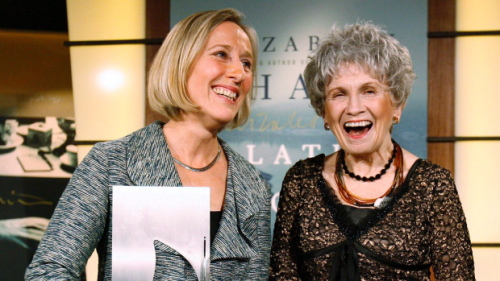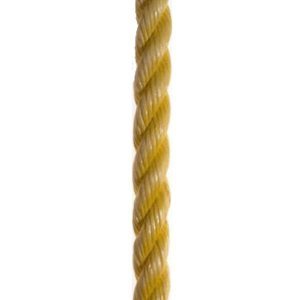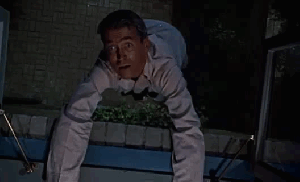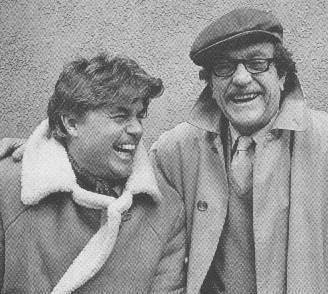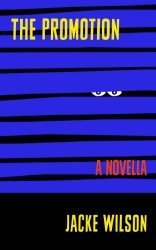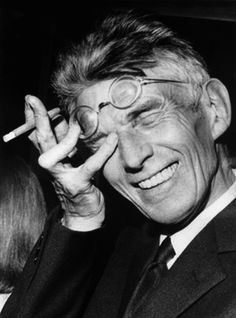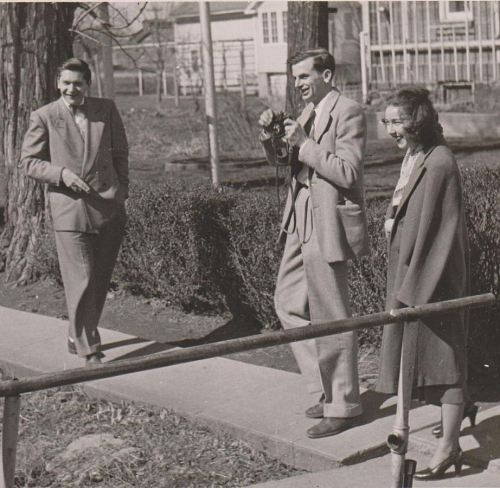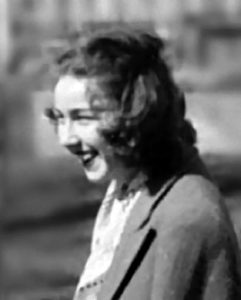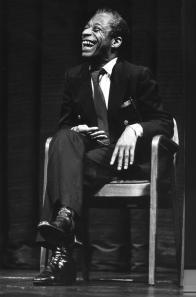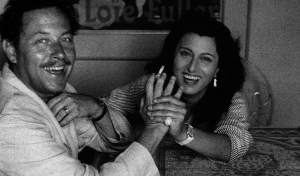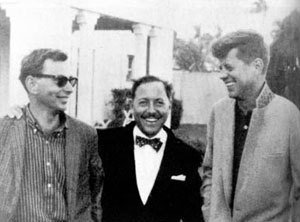Jacke Wilson's Blog, page 76
August 18, 2014
Writers Laughing: Alice Munro
Okay, sometimes these are a little hard to find. But there’s no shortage of photos of the amazing Alice Munro laughing (and a million of her smiling). I like this one for its spontaneity and joy…
Author Elizabeth Hay is on the left. And here’s a bonus! Alice with a special guest…
It’s Margaret Atwood! Can there be a more adorable picture? This should be on billboards at the Canadian border. Welcome to Canada! LOOK WHO WE HAVE HERE! And all good tourists would enter with a smile.
One last bonus: the young Alice. Not quite a laugh, but pretty cool nevertheless:
Image Credits: (J.P. Moczulski/Canadian Press); Sheila Munro; Reg Innell courtesy the Toronto Star)


August 14, 2014
A History of Jacke in 100 Objects #24 – The Rope
I didn’t like my new boss much. On my first day he had me scraping tar off the inside walls of his truck, ten hours in a hot, enclosed space breathing in noxious odors. The second day he blasted “beer farts” all the way to Skokie and back, and I had to sit next to him pretending not to be disgusted. On Wednesday I jumped in the truck and nearly passed out from the toxic chemical smell that greeted me.
“It’s heavy duty paint we got back there,” he explained. “Heavy. Duty.” He narrowed his eyes. “As in, not legal in some states. If you know what I mean.”
He went on to explain that we would be painting some equipment on the roof of a factory. It needed some kind of weather protection that normal, legal paint couldn’t provide. I had no idea if there was any truth to this. He had apparently convinced someone at the factory that this was necessary, and that he was the only one criminal enough to do it.
It took us about an hour to get there. Southern Wisconsin and Northern Illinois are full of old, broken-down factories; I was surprised by how neat and clean this one was. All the landscaping was perfect, with well-trimmed trees, sculpted hedges, and a circular pond with a fountain precisely in the middle. This did not seem like a place that wanted to skirt the law.
Then again, maybe it was. Since then I’ve learned that some of the cleanest, most sterile places are the homes of some of the most vicious lawbreakers around. Why look like a criminal when there’s money to be made?
Even so, this place took things a little far. In the parking lot, all the cars were parked in neat rows. Workers wore white coats, like scientists, and walked on well-designed sidewalks before disappearing inside the glass entrance.
My boss seemed tense. These were not his natural surroundings. He had been much more comfortable the day we tarred the parking lot of the Skokie Hooters.
“What do they make here?” I asked.
“Something for airplanes. High-tech. These people are all rich, even the grunts on the line. On the other hand, it’s no way to live. They have a guy come around and cut your hair. A barber who works right in the factory! Full-time!”
I liked hearing about small steps that employers took to benefit their workers. “It sounds like a good idea,” I said.
“Not if you don’t want your hair cut allatime.”
It was strange how I had wound up in this job. This was my last summer before college, and my other boss was vacationing in Mexico. For two weeks I planned to earn a little extra money with this guy. All of my friends had warned me not to do it. But I had no other options. Who hired someone for two weeks?
And maybe there was something more. I was about to leave this world behind, and I was not sure what that would mean. It was the only world I had ever known. I had come to realize that I wasn’t very good at the things that the people of this world were good at. My strength was in school—reading, writing, math, whatever else came out of a book. Their strength was all in other areas. Cars, boats, tractors. Guns, machines, engines. Things I knew nothing about.
They hired me anyway, practically for laughs. I tried to be useful. If they had a bill to prepare, they’d hand it to me and laugh about “the college kid” being able to “get the math right for once.” But if the truck broke down, or if the tank of LP gas needed refilling, or god forbid if any welding needed to be done, it was assumed I’d be standing off to the side, completely clueless about what was going on.
Weeks from now I would not be in this world of trucks and snowmobiles and cabins up north and scrap metal in the front yard and welding equipment in the workshop out back. It was like one of those situations where a director hires an actor and they decide a few days into the shoot that the actor isn’t right for the role. We were parting amicably with respect for one another. Except this was not a movie. It was my life.
And I didn’t know quite what I’d do on the other side. I assumed I’d fit in better at college. But what if I didn’t? What if it was too great a reach? I’d be right back here, back home, doomed to be the one on the side of the road, smiling awkwardly and watching the real work happen.
As we drove through the parking lot my boss’s anxiety turned into agitation. “Just look at this place,” he growled. “These guys are insane.” We drove to a smaller parking lot and parked near the factory’s front entrance. The cars in this lot had all backed into their spots, which were arranged neatly around a small circular plaza like the petals of a flower. From the air, our ramshackle truck must have looked like a half-smashed wasp that had crash-landed on the flower and could do nothing there but die.
I hopped out of the truck and opened the back door to retrieve the paint. A man came running out of the building. He didn’t yell—clearly one didn’t yell in this setting—but when he reached us his voice was urgent.
“You can’t park here,” he said. “It’s the executive lot.”
I looked around at the cars: the wealth on display was extraordinary. Lexuses, BMWs, a Ferrari Testarossa I had previously only seen on a poster. A man in a uniform stood wiping one of the windows with a soft cloth. Apparently that was his job, to wash these cars every day. He looked lonely.
My boss grumbled about rules and restrictions and top buttons buttoned even in the goddamned summer, but what could he do? These people were paying us, and this was their turf.
After I unloaded the paint he moved the truck to a ramp hidden behind some hedges, where we parked without being seen by the people drifting in and out of this crazy immaculate factory. That was us: a necessary evil, like dumpsters and plumbing. Out of sight. Existence tolerated but not viewed.
Suddenly I was hit by a wave of nostalgia. The truck and my boss felt like where I belonged. I was not sure where I was headed—I certainly didn’t aspire to be an executive of a company that made airplane parts—but I wasn’t sure I would ever fit in the way I fit in with guys like my boss. Except I didn’t really fit in with guys like him. They all basically scorned me, although they did so with some affection. It was a confusing summer.
Luckily I had practical tasks to stop myself from thinking too much. I started walking toward the building’s entrance. My boss caught up to me on a dead sprint.
“What are you doing!?”
“I’m taking this to the elevator,” I explained. “You said we’re painting the roof?”
He lowered his voice, remembering his surroundings. “Jesus, kid. You trying to get us kicked out of here?”
“Of course not.”
He shook his head. “You,” he said, “are like a goddamn flower.”
I didn’t know what to say.
“Didn’t I tell you what this paint is like? And you want to take it up the elevator? Do you have any idea what would happen if some of that paint sloshed over the side?”
“The pail has a lid,” I pointed out.
“It’s not worth the risk!” he said. “One drop of this on their blessed carpet and we’d be run out of here at the end of a flaming pole.”
I nodded. It made sense. Then he reached down and pushed the lid down and it made even more sense.
“That’s not the lid for the pail, is it?” I said. “You used a lid from some other pail, didn’t you?”
“Oh, you,” he sneered. “You’re going to be absolutely sensational in college.”
As if in response, at that moment the pail buckled and the lid popped off. My boss tamped it back down with his boot but not before I had seen the paint swirling inside. It looked metal and shiny and dense, like pure mercury. Who knew what was in that stuff? Mercury and plutonium, for all I knew.
“How are we going to get it up there? The stairs?”
“Howawegonnagettuppawaaawaaawaaaaaaa,” he jeered. “The stairs? The stairs!? Jesus, kid, that’s even worse. One bad step, and pffft, we’re goners. We’re NOT using the stairs. Luckily I thought ahead.”
I saw now that my boss was holding a contraption: metal brackets fastened together and a rod with a ball bearing jutting out like the tip of a crane. A pulley was attached to the end of the rod. Like most things my boss owned it appeared to be something he had rigged up in his workshop.
He shook it at me. It jingled.
With his other hand he pointed at the pail of paint I had set on the sidewalk. “Leave that right there,” he said. “Do not touch it. Wait ten minutes, then come up to the roof.”
I stood on the sidewalk for ten minutes, thinking that I would have done better at this job if my boss would have told me more about what was happening. On the other hand, I knew that all my friends in high school would have known what to do without being old. They were much better at this kind of thing. Trying to be useful, I stood careful guard over the pail of toxicity to make sure nobody knocked it over on their way inside. In ten minutes not a single person passed by.
When I joined my boss on the roof he was smiling with satisfaction. “This,” he said, waving at his contraption, “is the work of a genius.”
He reminded me again of how toxic and unbelievably adhesive the paint was. Then he informed me that even carrying it through the factory without spilling would be a disaster. His idea was that the people inside would never tolerate the risk of having it in the building at all.
“They know how heavy duty this paint is,” my boss said, “unlike you, flower.”
My heart fluttered. I ignored the insult. I was too busy wondering if I should have left such a bucket unguarded on the sidewalk. But what else could I have done?
What would Eddie Perkins have done? Eddie Perkins, one of my classmates, could take apart an entire engine and put it back together. I could add oil and windshield wiper fluid and gas—and that was about it. In shop class, Eddie Perkins made a grandfather clock in half a semester, then, bored, wandered over to the metal shop and made a set of fireplace tools. It took me all semester to make a dowel shelf and had to come in on a Saturday to finish.
On the other hand Eddie had failed Civics class seven straight semesters and only passed after the principal intervened. (“We don’t want Eddie Perkins back here another year,” was the rumored statement to the Civics teacher, who reluctantly gave him a D minus.) He and I were friends, but how do you overcome that wide a gulf? Or if you do, how do you sustain it into adulthood? We were destined to drift apart, it seemed. We had always known this: now was the time when it was happening.
And my boss was basically Eddie Perkins plus ten years. To him I was the ineffectual flower. I was no good at this job. And yet I clung to it! I was not ready to give all this up!
My boss had set up his contraption on the edge of the roof with some canvas straps. Now he was threading a rope through the pulley. The rope looked thin to me. The brackets did not look much thicker. And how in the world would those straps hold the thing in place? For the millionth time I was glad I was not my boss. This thing looked doomed.
“Your job,” he said, hurling one end of the rope down to the parking lot where the paint was still sitting, “is to sit right here and pull this rope up the side of the building.”
My stomach sank. I could only imagine how long it would take me, if I was even strong enough to pull it. All those seconds, or minutes, of me pulling that crazy paint up the side of the building, four stories up with a bracket that was probably slipping. I could easily predict that there would be a point where it started to go wrong and I would not know what to do about it. If the contraption slid, and it was just me holding one end of a rope, and the paint was swaying, with that ill-fitting lid…how could I possibly stop it from sloshing all over the place?
I peered over the edge. The end of the rope had just missed hitting the bucket, which somehow felt like my fault. Looking at the rope spinning and swaying against the background of the executive parking lot made me feel dizzy.
“Maybe you should do the pulling,” I said.
“Are you insane? You think I’m going to let you tie it?”
I nodded. This made no sense to me—why couldn’t he tie it, then come back up to do the pulling?—but he smiled, and I smiled back, and it seemed like I missed my chance to say anything.
He pulled a pair of gloves out of his back pocket and put them on.
“Wait,” I said. “Shouldn’t I wear those?”
“Sorry, kid. I only have one pair.”
I frowned. “But the rope might burn when I’m pulling.”
“With those young hands of yours? Come on. It will be good for you. Toughen ‘em up.”
“Why do you need them?”
“I told you how toxic this stuff is!” he said.
He disappeared down the stairway before I could object.
Not logical. Not logical. Not logical.
I waited for what seemed like an hour before finally peering over the side of the building. My boss had just finished tying the rope to the handle of the pail. His thick knot looked like something I could have come up with.
“Hokay!” he shouted, waving his arm. His optimism seemed completely misplaced, but it gave me strength nevertheless.
“Hokay!” I shouted back.
“Start pulling!” he yelled.
“Hokay!” I yelled back.
I took the end of the rope, wrapped it around my hands to make sure I didn’t accidentally drop it, and started tugging it through the pulley. To my surprise, it pulled toward me with almost no resistance. Then, suddenly, just as I was thinking how easy this was going to be, and mentally praising my boss for somehow inventing this amazing contraption, the rope jerked to a halt. So far I had merely pulled out the slack in the line.
“Start pulling!” my boss yelled.
I took a breath. “Hokay,” I said to myself, staring at the pulley.
I pulled with both hands until I got it moving, then switched to hand over hand, pulling the rope about three inches. The pulley creaked; the straps slid to the side of the building, making my heart stop, but fortunately they were only finding their new position under the weight of the pail and did not move further. I pulled again. By now I must have had the pail about six inches off the ground.
“Keep pulling!” my boss yelled. “You’re doing great!”
I pulled another three inches. It was heavy but manageable. I kind of wished I had come up with some other kind of backstop other than the loops of rope around my hands, like a pole or something else that would let me pause to rest. Eddie Perkins would have done this, of course. He probably would have macgyvered some other kind of solution, turning his wristwatch into an engine to automatically power the pail up the side of the building while he sat drinking a can of MGD.
I couldn’t change that now. I lacked practical skills and missed my chance to give myself a backstop. But I had an eighteen-year-old’s muscles and a mind full of determination, with a special reserve of panic to be called upon as soon as I needed it.
Three inches. Three inches. Three inches. The pulley creaked as the rope slid through. My forearms began to hurt. Another three inches. My biceps hurt. My wrists strained.
Three inches. My shoulders felt like they were on fire.
Three inches. I felt a twinge in my back.
I began to look around for some help. What could I do to give my muscles a break? The rope was beginning to burn my hands. I was not sure how much longer I could take.
“Hokay,” I gasped. My voice was not nearly loud enough to reach the side of the building, let alone the parking lot below. “Could use a lil’ help up here…”
I heard a car start. I hoped it was not the truck. My boss sometimes ran errands or went to lunch without telling me he was leaving.
Three inches. Three inches. Three inches.
In the middle of this exertion I had the strangest vision, a memory of one of my childhood birthday parties. We were playing a game in which you wear a blindfold and use a heavy spoon in one hand to scoop cotton balls from a big bowl on the table onto a paper plate you’re holding on your head. Everyone around you yells encouragement, but of course you have no idea how many cotton balls are actually on the spoon. A friend of mine had oh-so-carefully lifted his spoon several times to great acclaim, then removed his blindfold to find that he had not managed to bring a single cotton ball on his plate. For five minutes he had been mistaken, grinning like a hero.
What if there was nothing at the end of this rope? What if it was a big rock? What if the pail had completely tipped over…my boss a silver ghost…
Holding my hands in position, I slid forward as far as I dared and peered over the side of the building. The paint was still there. My boss was below, his head tipped back, watching the can ascend. I almost fainted from dizziness and pulled my head back to stare at the pulley rather than the vertical drop beyond.
The can had been about a third of the way up the building.
“What are you doing?” my boss called up. “Just keep pulling!”
Grimly I told myself that I would reward myself with something excellent afterwards. The only thing I could think of was taking a bath and soaking my hands until the ruby-red grooves disappeared, then eating a bag of Fritos with cheese dip.
Simple pleasures. Well, whatever it took.
Three inches.
Three inches.
Three inches.
I began to wonder if I had it in me to finish. I was straining now, and a line of sweat rolled off my brow and into my eye, stinging it and making my contact lens float around, blurring my vision. I kept pulling. I kept pulling. I kept pulling. Through the suffering. Through the pain.
I could not abide the idea of failure. Physical things were not my strength, but Jesus, what in the world would it mean if I could not even pull a rope for ten minutes? I had once worked on a farm picking up rocks all day, for God’s sake. It’s not like I was pulling a car up the side of a cliff. It was just a bucket of paint.
Then I wondered how the pail had gotten so heavy. Maybe it was the crazy paint. Maybe the heavy metals got denser with altitude. But no, that was ridiculous. It was all in my muscles. And my mind.
I pulled more. From down below my boss shouted encouragement.
And then a new thought hit me, and I did start to panic: How would I get this thing over the side? The contraption had no mechanism for getting the bucket from the top of the roof to where I was. I was like a fisherman with a big fish on the end of a line but no way of getting the fish into the boat.
Maybe my boss would come up to join me?
“Hokay!” I yelled. “Getting close!” But my voice died in my chest. And how much reeling was there left anyway? There was a pile of rope coiled at my feet, but I had no way of knowing exactly what that meant. Maybe I wasn’t close. Maybe I still had several floors to go.
I had been doing this forever, but I had slowed down too. I had no way of knowing.
I peered over the side of the building, trying to figure out how I would get the pail up over the edge of the building. As soon as I did my eyesight clarified itself and I felt a surge of energy in my chest. The bucket was only about two feet away! The lid had miraculously remained in place, and the handle was right there, just another half-dozen pulls or so away. I could get it close and grab the handle.
I watched the bucket getting closer. I was no longer afraid of the parking lot, or a spill, or the dizzying height. The pail was so close! And I had the strength! It was a crazy, impossible task, everything had been stacked against me—and I had done it! I, Jacke Wilson, had come through!
I reached out my hand, my fingers inches from the handle…
And then the rope broke.
I cannot tell you exactly what it was like to watch that pail of paint falling to the ground. The lid flew off and spiraled to the side, and the rest of the can fell straight down, down with heaviness like a sandbag at the end of a balloon, the pail tipping to one side but not enough for any paint to fly out. No. It all stayed right where it was, falling. It just fell, down, down, down in this horrible, dead way.
And I fell with it. That’s how it seemed, anyway.
Everything I knew about myself, my whole history, seemed to be in that pail. I felt like I was plummeting too, as if I had just jumped out of a plane and had not yet opened my parachute. I kept my eyes wide open, astonished, as my boss cried out in alarm and jumped out of the way.
It was deathly quiet for a second. Then an almost beautiful bursting sound—poomfffff—and a perfect spray of silver, rising up and out of the pail like a fountain. I winced at the sound, and at the knowledge of what all this meant, and at the crushing weight of knowing that the project had failed. The project, and my boss, and me. We had tried our best, and we had all failed.
I stared at the parking lot for at least a minute. I was in a trance, marveling at how the paint had spread in a perfect circle, dabbing every single car with silver. What would happen to those cars? Could you scrape it off? Would they need to be repainted? It was incredible. The cars were like petals of a multicolored flower, with a single color, a dash of silver, in common. If it wasn’t so horrific it would have been beautiful.
I felt a hand on shoulder. My boss was pulling me to my feet. He looked angry enough to kill me, to push me right over the side. A streak of silver ran straight across his forehead. Another one ran around his shirt like a belt.
“It looks like a flower,” I said in a daze.
He shook his head slowly and let me go. Maybe he knew it wasn’t my fault. Maybe he was in shock himself.
“We’re ruined,” he said.
I knew better than to ask if he had insurance. Of course he didn’t. That was not the kind of thing that he believed was important.
“They’ll understand,” I said without any conviction whatsoever.
He shook his head. “Not these people. You’re fired, by the way. If you care.”
It did not seem reasonable to ask him to blame himself for giving me an old rope to use. Clearly he had to fire someone. How could he fire himself?
We went downstairs. I waited silently in the truck while he went inside to do whatever he had to do. A few minutes later he tapped on the window.
“I said you’re fired,” he said. “Get out.”
I didn’t understand what he meant.
“You’re fired. Fired. I fired you.”
“How will I get home?”
“That’s not my problem.”
I decided not to ask for my day’s wages, which would have been monstrous under the circumstances, and walked alone through the parking lot as the manager came out and started screaming at my boss. Now it was time for screaming. This qualified. It was better that I left, to give my boss someone to blame, although I doubted that would help.
I could end there, with me walking alone out of the parking lot, but there’s a coda to the story. A final surprise still awaited.
*
After I left the factory gates I had to figure out how to get home. It was about a half-mile to the interstate, which was basically in the middle of nowhere. I estimated that it was about thirty or forty miles home, way too far to walk. I had seen a movie recently in which several hitchhikers had been killed so that was not an option.
I decided to walk to the next exit and hope there were some houses where I could use the phone. How would I explain? At least I didn’t have any paint on my shoes or anything. I congratulated myself for being so careful on my way out the grounds of the factory, tiptoeing around to make sure I didn’t step on any stray drips. It seemed astonishing that I was unsullied.
After about ten minutes a car going the other way swerved around, through the median in a u-turn at seventy miles an hour, and nearly hit me in the ditch. Gravel kicked up and it took a while for the dust to clear.
It flashed in my mind that this was one of the cars with paint on it. The driver was looking for me, coming to mow me down. Where would I run? How would I hide?
“Jacke?” a voice said through the window.
The door kicked open. Eddie Perkins grinned, happy for a passenger, happy to see me. He swerved back through the median and before I knew what was happening we were roaring down the highway, headed to the racetrack north of Chicago to bet on the horses.
“I got a tip from a guy in Skokie,” he said. “Today’s your lucky day!”
“Indeed,” I said, just to hold up my end of the conversation. But then I told him I didn’t have any money on me.
“I’ll spot you. You’ll prolly need it for books or whatever.”
Eddie Perkins, a self-employed cabinetmaker, always had plenty of money. Already he was in demand all over Chicagoland. As a high school near dropout he made more than most doctors. Who needed college when you had that kind of natural ability?
I almost asked him how you removed heavy duty paint from cars, because he probably knew, and because knowing there was some solution would help me feel better about what had happened. But before I could say anything he reached over and set a fifty-dollar bill on the dashboard.
“If you can grab it you can have it,” he grinned.
I reached out for the money. He gunned the engine, throwing me back against the seat. This was a big, powerful car. He had rebuilt the engine to increase the torque, however one did that.
“Try again,” he grinned.
Again and again I tried to grab the fifty. Eddie timed it perfectly, knocking me back every time, until we both were laughing.
The windows were down. This was the kind of summer pleasure ride that I would not do for very long. College was days away. I would do different things there. Like what? I didn’t know.
I only knew that this was all ending. When would I ever ride in a car with someone who could pull off that double swerve on a highway as if it were nothing? It was scary but also comforting to be with him. These guys, my friends, couldn’t hold a job, addictions and other pains were around the corner for many of them. But they lived in the world in a way that I could only admire.
Yes, it was almost over for me. And I would really, really miss it.
“What were you doing on the highway?” he asked.
“It doesn’t matter.”
“Come on.” He giggled. “Come on, Jacke Wilson.”
When he put it that way it did seem comic. It was not the sort of thing I typically did.
“I got fired!” I finally said, laughing and feeling almost giddy at how one experience had morphed into another. Somewhere there were executives finding their beautiful cars ruined. And I was on my way to the racetrack in a souped-up muscle car. Life did not make sense. And yet it was sort of beautiful.
“I’m sorry!” he shouted over the rush of wind blasting through the windows and whipping through our hair.
“I’m not!”
He laughed a crazy laugh. I tipped my head forward, laughing until my eyes watered, and finally raising my hand in desperation, one last feeble try at the fifty. But Eddie gunned it again, and I fell back against the seat, staring at the ceiling and still laughing and feeling as if I could just go straight up through the roof and zoom all the way into the sky, higher and higher and higher, with everyone else down here among the cornfields and highways and farms and factories, and somehow I alone would launch into the air and climb and rise and drift and float and never touch ground again.
*
Uplifting! Well, sort of. I recovered from that incident and went straight into the arms of my roommate and his wonderful books. Feel free to read that one next, or roam your way through any of the other 100 objects here on the site. All for free!
What else is free? Review copies! Send me a note and I’ll ship you a copy, paperback or e-version, at your preference.
And of course, I would not be a professional author if I did not also tell you about my work-for-pay plan. I do the work. You pay. In exchange you get knowledge and (hopefully) some amusement. And of course, you receive the remnants of my effort. Five dollars for a paper remnant. Three dollars for an electronic remnant. Is that too cryptic? It’s books, people! Five bucks for The Race or The Promotion. Politicians surviving scandals, lawyers chasing figments of their fevered imaginations. Books!
(And for a limited time, a special deal: A book for a dollar! It’s like one of those fantastic library sales. All proceeds will go to the maintenance of this website and my person.)
And here, for your readerly entertainment, is a deleted scene. What can I say? It’s not typical for me to offer a Director’s Cut version. But in this case I had promised an Alfred Hitchcock cameo, so I thought I’d better pass this along. In the original version this scene comes as the narrator is watching the pail descend:
About a week before this I had taken my sort-of girlfriend to Madison to watch an Alfred Hitchcock movie—Rear Window—on a giant screen. I had recently discovered Alfred Hitchcock movies and this particular movie was perfect for a date: sophisticated but fun. While watching I became completely immersed in the story, in which Jimmy Stewart, whom I had known as George Bailey for years but now enjoyed seeing him in color, plays the lead to the astounding Grace Kelly. At the end of the movie, he’s attacked by the villain and left dangling from a window, and I was waiting for the moment when he would climb back up. What would happen? A shot would ring out, the police or Grace Kelly or someone would take care of the bad guy, and Jimmy Stewart would climb back into the apartment. Or he would summon superhuman strength and make it up there on his own. Or the villain would get bored, or Jimmy Stewart would talk him out of it. What would happen? There were not that many options.
What happened was that he fell. George Bailey. Dropped like a stone onto the sidewalk. And there in the darkness, I gasped. I had not predicted that at all, and it almost gave me a heart attack.
Watching that pail fall made me feel the same way.
Onward and upward people!
Image credit: vodkacranberryclooney.com (from Rear Window, Paramount)


August 12, 2014
Writers Laughing: Kurt Vonnegut and John Irving
Here’s a reminder that life has moments of joy as well as sorrow.
What a great picture. Why do I think that Vonnegut must have said something funny (unexpected and acerbic and witty), and Irving started laughing uncontrollably, and finally Vonnegut joined in because Irving’s laughter was infectious…
Have a great day, everyone! Onward and upward!


August 11, 2014
Sneak Preview: The Promotion
In honor of on-campus interviewing everywhere… an excerpt of The Promotion (on sale now at Amazon.com):
When Big Law Meets Big Trouble…
“Humor, depression, and hope all together in one short book… The Promotion was my first book by Jacke Wilson, and now I am wondering if I have been sleeping under a rock not to have noticed this amazing author…” – My Author Within
CHAPTER ONE
You need to understand this first: I have a weakness for people with passion.
And they had it, these candidates! They had passion! A love for life, for their careers, for themselves. Some wanted to join our firm. Wanted? They longed for it. They ached. They burned. Even those who secretly hated us thought they could change us, once they added themselves to our mix. That’s what passionate people do. They believe in the impossible!
Was this exhausting? Was I so jaded that I couldn’t bear to see the throngs of innocents at our door? Innocents? It was innocence itself knocking, and who could ever tire of that? They rejuvenated me. I could not wait to welcome them to our firm. The new, the proud, the eager, the full of passion!
I knew very well that passion has the power to overwhelm. You have to meet passion with high energy, or the impassioned will leave you behind. Transcend you. Cast you aside.
You don’t want to be transcended! You don’t want to be cast aside!
How well I knew this, exactly at that moment! My marriage had just ended because of passion.
That sounds like lust, an affair, another woman, another man. But that was never the problem.
No, the problem was blackjack. A passion for it.
When I first met my wife she was on her way to Las Vegas, lit up with excitement. Eager to clean them out. She said this with certainty as we waited in line to check our bags.
“You’re a card counter?” I cried.
“No,” she said, her eyes bright and a little wild. “I’ve developed a betting scheme.”
A betting scheme! A formula for doubling after wins and cutting back after losses, maximizing the winnings during hot streaks and minimizing the damage of cold ones. It sounded highly plausible. I abandoned my plans and joined her in Vegas.
It didn’t even matter whether it worked or not. Princess or pauper, high roller or washout—the point was that she cared enough to want something and want it badly. I was excited about being near her. We were each, in different ways, slaves to her passion. Devoted to her betting scheme.
Betting scheme. A few years later, after we’d been married and she’d lost everything we had, I looked up the phrase on the Internet. Blackjack betting schemes. And I found an article that said that yes, blackjack offered some of the best odds in Vegas. Unlike most other games, in blackjack you can reduce the house advantage almost to zero, and through strategic playing and following certain algorithms you can—even without counting cards—often leave the table a winner. It offered your best chance to beat the house.
And then, the sentence that made my blood run cold:
However, the worst thing you can do is to believe you have developed a betting scheme.
I learned that my wife had not been the first to fall for the streaks idea. Streaks did not exist in nature. You couldn’t count on runs of ups and downs. You had to bet each hand as if it were the only one you were going to bet that day, make your decisions on sound mathematical principles, win or lose the hand, and start the next one with the same clinical detachment.
I showed her the article. But did that stop her? No! Of course not! In fact the opposite occurred. She took it as a good sign: all her losses—the years and years of losses—had “pre-confirmed” her new theory.
“There are no streaks,” she said in a mystified voice.
“It’s okay, honey.”
But she was already getting her things ready. There was a casino in West Virginia she could get to in an hour and six minutes. “No streaks!” she called over her shoulder. “My scheme still works—I just have to do the opposite of what I was doing before!”
Passion, my friends!
Had I overcome my own weakness for passion in others I might have stopped her. But I didn’t, and when she came home broke—actually broker than broke, as she left in our car and returned by bus—she announced that she was leaving me. She denied it had anything to do with gambling, but I knew better. I knew the role that passion had played. I had doubted hers for a moment, and she could not bear to be near me after that had occurred. At the beginning I had chosen her for her passion. In the end she chose her passion over me.
As I was absorbing the blow of this loss, or maybe because I was still suffering from it, a strange thing happened at work.
I had just drafted a memo for a client. In the cover email, I reminded the client of what she had requested and briefly summarized the key issues. Then I wrote that there were three other things worth noting, followed by a bulleted list.
Something about the email seemed funny. I spent a few moments looking at it, trying to puzzle it out, until it hit me. I had not written that there were three other things worth noting. I had written that there were three other things worth nothing.
I shook my head, chuckling at how close I had come to sending an email to a client with such an embarrassing typo. What a fantastic mistake! I prepared to tell the story:
There were four words in a row with a th in them, and I guess I was on a roll. So instead of pointing out to the client that there were “three other things worth noting,” I said there were “three other things worth nothing…”
I could hardly wait to get home to share this with my wife…except of course she was gone and my house would be empty. But I couldn’t keep this to myself! A colleague, maybe? But when? How? I never socialized with anyone at work. When would I get the chance to tell the story? At the next litigation lunch, scheduled for—I checked the calendar—two weeks from Wednesday?
I looked at the sentence again. Worth nothing? Ha—what if that were true?
But I was being paid to write these things. So it was demonstrably untrue.
Wasn’t it?
I closed the blinds behind me as if I were undertaking some kind of illicit project and forced myself to consider the bullet points, one by one.
The first point was this:
This is a draft and may change as circumstances warrant.
A hedging strategy. An absence of commitment. A loophole. What was that worth to the client? It was probably worth nothing! The attachment itself said DRAFT on every page.
Surely the second point would be better:
I would be happy to make changes based on your feedback.
I swallowed hard. This, too, said nothing of consequence. This was being sent to the client! She was paying for this; if she didn’t like it, she would request changes and I would make them. That’s how this worked. And whether I was happy to make the changes was entirely irrelevant. Even if I wasn’t happy—let’s say being asked to make changes made me very angry—it would not change the underlying dynamic.
I was feeling uneasy. My entire career was based on emails like this one. It was all I did.
With mounting anxiety I reviewed the third item:
I’ll be out of pocket for a few hours but will be back online tonight.
This was the worst of all! This one was unquestionably worth nothing! The memo was not due any time soon. My short-term whereabouts simply did not matter. I was demonstrating some kind of commitment to responsiveness—which, again, did not matter. She could expect it, or not, and I would deliver it, or not. My statement was not worth noting. It was in fact worth nothing.
As I sat there stunned—at that very moment—our office manager appeared in the door to offer me the promotion.
* * *
Enjoyed this excerpt? Wondering what happens when the narrator becomes his firm’s Director of Recruiting and Attorney Development? Check out The Promotion (on sale now at Amazon.com in paperback and e-book versions) and find out! Onward and upward, people!


August 10, 2014
Writers Laughing: Samuel Beckett
Could anyone be bleaker than Flannery O’Connor? Well, okay, maybe Samuel Beckett. But take a look at this…
Maybe he’s thinking about the Amana Colonies.
Or maybe he’s just trying to quell the pain…


August 8, 2014
Writers Laughing: Flannery O’Connor
Oh, I know, I know. I should be promoting my latest book (price drop! we broke the buck!). I have another Object almost ready to go. I should be working on that. But how can I resist this one? Robie Macauley and Arthur Koestler – themselves two titans of the mid-century literary scene. And…
…and that’s Flannery O’Connor! Laughing! Here’s a close-up:
Love this! And guess where they were? The Amana Colonies. Of all places. The Amana Colonies. This is such a spectacular piece of the story I hardly know what to do with myself.
Happy Friday everyone!
Image Credits:
“Robie with Flannery 1947” by Cmacauley (talk) 22:41, 28 February 2010 (UTC). Original uploader was Cmacauley at en.wikipedia – Transferred from en.wikipedia; transferred to Commons by User:ARTEST4ECHO using CommonsHelper.(Original text : I (Cmacauley (talk) 22:41, 28 February 2010 (UTC)) created this work entirely by myself.). Licensed under CC BY-SA 3.0 via Wikimedia Commons.
“Flannery-O’Connor 1947” by Cmacauley – This file was derived from:Robie with Flannery 1947.jpg. Licensed under CC BY-SA 3.0 via Wikimedia Commons.


August 7, 2014
Writers Laughing: James Baldwin
Here we go again!
These are harder to find than you might think. So many poses, so many polite smiles, so many serious looks… and then now and then you find a gem like this one…
…and everything’s worth it. Like an extra shot of espresso added to my cup of Thursday.
Have a great day, everyone! Onward and upward!
Image Credit: LA Times


August 6, 2014
A History of Jacke in 100 Objects #23 – The Passage

The story begins with a great moment in literary autobiography – well, fine, let’s go ahead and say its one of the great moments in the history of literature itself. I have a personal story to throw in at the end. But the story begins here, in the famous passage in which Ford Madox Ford recounts his discovery of a then-unknown writer:
In the year when my eyes first fell on words written by Norman Douglas, G. H. Tomlinson, Wyndham Lewis, Ezra Pound, and others . . . — upon a day I received a letter from a young schoolteacher in Nottingham. I can still see the handwriting—as if drawn with sepia rather than written in ink, on grey-blue notepaper. It said that the writer knew a young man who wrote, as she thought, admirably but was too shy to send his work to editors. Would I care to see some of his writing?
In that way, says Ford, he came to read the first words of a new author:
“The small locomotive engine, Number 4, came clanking, stumbling down from Selston with seven full wagons. It appeared round the corner with loud threats of speed but the colt that it startled from among the gorse which still flickered indistinctly in the raw afternoon, outdistanced it in a canter. A woman walking up the railway line to Underwood, held her basket aside and watched the footplate of the engine advancing.”
Great editor encounters a passage from a new, unknown writer. And what was his response?
I was reading in the twilight in the long eighteenth-century room that was at once the office of the English Review and my drawing-room. My eyes were tired; I had been reading all day so I did not go any further with the story…. I laid it in the basket for accepted manuscripts. My secretary looked up and said: ‘You’ve got another genius?’ I answered: ‘It’s a big one this time,’ and went upstairs to dress.
Years ago I was taking a course co-taught by two professors, one charming and voluble, the other quiet and wise. The charming professor read the passage without revealing the ending. “Can anyone guess who wrote the passage?” he asked. “Anyone here recognize the style of writing?”
The grand professor looked around the room. As he expected, there was no response. But as it happened, I had read that book just a few weeks before. It was an incredible coincidence, one of the few times that something like that has ever worked out for me. It was far more typical for me to forget an answer, or to not know, than it was to have something so arcane right at my fingertips. But this time I did.
I hardly knew what to do. On the other hand, I didn’t need to do much.
“D.H. Lawrence,” I said.
“Aha! Exactly!”
To the professor’s credit, he was not disappointed by this shift in his plans.
Huh. Didn’t think anyone would know. Well, good for you. And now it’s time to return to our regularly scheduled programming, in which I tell you things I assume you don’t know, and you listen to them, because I am a genius like Ford Madox Ford, and I’ve discovered D.H. Lawrences in the past, but I don’t think we have any here, alas, not this time, poor you, I pity you all…
For a moment I had broken through, although “broken through” is probably an overstatement. I had earned an approving nod from the charming professor. That was as far as it went, or at least as far as I took it: sort of the equivalent of answering a Trivial Pursuit question. Answer correctly, receive pat on the head and another triangle to wedge into your game piece. As someone who viewed himself as a fan of literature if not exactly a scholar, I felt a spark of pride. It seemed like the kind of thing that I should know. At some point, I would be given a test, and if I knew things like this, I would pass it.
It was left to the wise professor to provide the comment that took me into a whole new world of literary possibility. Not, in other words, literature as what-have-you-read-I’ve read-that-too. Not lists and check boxes. Something else.
“I was just thinking,” he said after the charming professor, having noticed that his colleague was looking particularly thoughtful, asked him what was on his mind. “How interesting that passage is, considering that Ford’s greatest work is about not knowing.”
And there it was: the door opened.
I’m not sure I can put it into words, except I knew that the power of the passage in Ford’s autobiography was not merely that one great author had discovered another. It was something more. It was that Ford, who as an editor was so self-assured, so supremely confident in his skills and judgment, had also written that wonderful book The Good Soldier, which is all about the deception (and self-deception) of the narrator. The same man who could judge the greatness of an author from a single paragraph had also written a novel in which he conveyed the experience of being left completely in the dark. And we were here, now, sorting out the differences.
Had Ford himself experienced that feeling of deeply not knowing? Had he merely imagined its awesome, awful power? It didn’t matter. A life filled with certainty suddenly clashes with a horrible awareness of uncertainty: what does that do to a person?
In The Good Soldier, Ford gave us one answer. In the classroom, I embraced the mind-expanding power of the question.
From that day forward literature, for me at least, was not about scorecards and best-of lists. It was about engaging with the ideas within – the great minds of Chekhov and Lawrence and Baldwin and Porter and Tolstoy and O’Connor and Welty and Austen and Homer and everyone else who tried their hardest to look deep within humans – soul miners, all of them – who emerged with their eyes bright, their hands dark and glinty with the dust of what they’d seen down below.
That’s my story of how a discovery of literary greatness helped me discover the greatness of literature.
And while my discovery was certainly not as important to the world as Ford’s discovery of Lawrence, to me it felt – and still feels! – no less momentous.
*
Short and sweet! Well, maybe we needed it to get that ghastly shriek out of our heads. Other coming-of-age moments in #21 – The Speed Trap and #1 – The Padlock and #16 – The Laundry. Love of literature (and a misguided attempt to invent a philosophy) turns up in #19 – My Roommate’s Books. All the 100 Objects are at the main page.
What other news? Well, of course, my books The Race and The Promotion are still available. The e-book version of The Promotion is now on sale for just ninety-nine cents. Ninety-nine! Sounds like a big number to a three-year-old, but you and I know differently, don’t we, reader?
Okay, those links are to the Amazon page, but really, wouldn’t you rather have a free copy? I’m happy to send you one in exchange for an honest review, which you can leave on your blog, or at Amazon, or Facebook or Goodreads or wherever else you call virtual home–
Aha, I hear you say. I’m onto your tricks, Jacke! You’re enticing me with free merchandise simply to burden me with the task of writing a review and publicizing the product. And if I buy the book, for a mere five dollars (three for an e-version) I can be free of this burden! The choice seems clear, Mr. Wilson! Five dollars is a small price to pay for the option to review or not to review!
Readers, I don’t know what to say: you’ve outwitted me again! Onward and upward!
Image Credit: marketmybook.in
Excerpt: Ford Madox Ford, Portraits from Life (Boston, 1937), 70-71.)


Writers Laughing: Tennessee Williams
Oh, man, these are fun. Here we go!
Who wouldn’t be having fun with the spectacular Anna Magnani? And here’s a bonus happy Tennessee Williams photo, with a couple of surprise guests:
That one’s a little staged, a little more of a smile for the camera than a genuinely candid laugh. Not quite right for our Writers Laughing series, in other words. (Jean-Paul and Simone and Zora set a high bar!) But still a good way to get a Wednesday smile going.
What else can make you smile? Well [humble cough] maybe a well-reviewed (okay, make that VERY well-reviewed) comic short novel, temporarily discounted in honor of August… only 99 cents… treat yourself to some deadpan humor…and of course…o nward and upward!


August 5, 2014
Price Drop: The Promotion For Less Than a Dollar!
Some exciting news! The Kindle version of my short novel The Promotion is now available for just ninety-nine cents!
Why now? Well, August is a good month for reading (and not much else), and I support readers and reading everywhere….but that’s not the real reason.
What are we really celebrating? In the world of law schools and Big Law this is the season for a particular insanity known as On-Campus Interviews. Law students everywhere will spend a few days this month in some hotel or conference center, drifting from room to room, interviewing with firm after firm after firm, like zombiefied overachieving speed daters. Except there’s nothing like love or intimacy at the end of this rainbow. It’s a lot of work in a professional setting. A marriage between Work Originators and Billable Hours. Turtles all the way down.
So students are eager and try to appear as if they’ll be reliable and competent, and recruiters are trying to be realistic and informative and somehow not stomp all over the youthful enthusiasm. This will wind up leading to a beautiful relationship, hopefully, which in this context means one that’s going to exist for a few years so we may as well make the best of it, dammit. (Nice marriage if you can get it.) And the twenty minutes at the Doubletree will be followed by a round of callback interviews and the incredible phenomenon known as the Interview Lunch, and it lasts for a few weeks and then it’s all over and you’re left wondering what the hell just happened, until you go to the firm and do it all again from the other side and it is equally as strange.
The Promotion tells the story of a washed-up, beaten-down lawyer asked to serve as his firm’s Director of Attorney Development and Recruiting. (The “development” part is a fiction, he’s told – merely included in the title “for marketing purposes.”) And so he launches into a series of luncheon interviews with his assistant directors, a humorless woman who cannot maintain a conversation with reasonable humans and a hostile partner determined to insult every candidate who walks through the door, when he’s not tearing down the firm to them (“truth-telling,” he calls it).
And at the same time the recruiter starts to lose his grip on his sanity and chases a woman to the ends of the earth, or at least rural Wisconsin, which in this case amounts to the same thing. (Said with affection and nostalgia!)
It’s easy to make fun of all this. But I have a deep residual sympathy for the people who go through it, on both sides. There’s nothing nefarious about it. It’s not evil. It’s just very, very strange. And whenever a fiction writer encounters something strange, the antennae start twitching, and you start thinking Jeez, what an odd setting, the people here are not asked to act normal, and maybe I can do something with this... And here we are! The Promotion! Available on a Kindle for just 99 cents! (For a limited time!) Previews are free!
Don’t have a Kindle? Don’t worry! You can read it on your phone or tablet as well. And the paperback is still somewhere under five bucks, depending on the Amazon discount.
So enjoy the book at the deeply reduced price. If you’re part of this world, enjoy the humor. If you’re not part of it, enjoy that too. And for all my readers, there are plenty of other elements to keep you going. And if politics is more your thing (another bizarre setting, antennae twitching again…) feel free to check out my other book The Race, about a former governor of Wisconsin recovering from a sex scandal. Not discounted. But still cheap.
Onward and upward! And Happy Merry On-Campus Interview Season, everyone!



